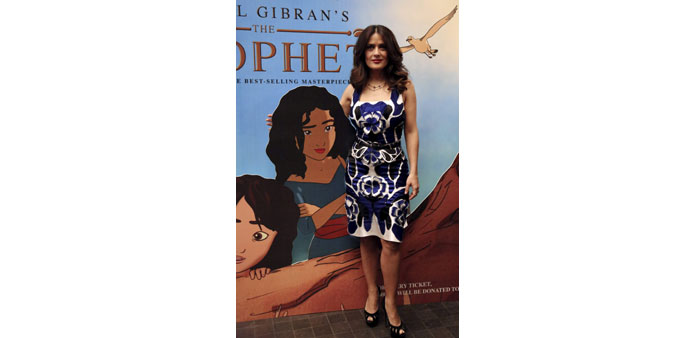Hayek poses in front of a billboard for The Prophet in Beirut yesterday.
AFP/Beirut
Hollywood star Salma Hayek, in her ancestral homeland Lebanon for the first time, launched the global premiere of her animated adaptation of Kahlil Gibran’s celebrated novel The Prophet yesterday.
The Mexican actress and director described the movie version of the Lebanese author’s spiritually-uplifting book as a “love letter to my heritage”.
She said the adaptation, which features an all-star cast, was a “personal film” because her Lebanese grandfather loved The Prophet.
“Through this book, I got to know my grandfather. Through this book, I had my grandfather teaching me about life,” said the star, who has been in Lebanon since Friday.
The Prophet, now in its 163rd edition, is widely considered the second most-read book in the world, after the Bible.
The movie adaptation, screened in Beirut yesterday evening, features the voices of Hayek, along with actors Liam Neeson, Alfred Molina and Frank Langella.
A collection of poems and prose, originally written in English, The Prophet has been translated into more than 40 languages since its first publication in 1923.
It tells the story of Almustafa, who before returning to his homeland, speaks to residents of the city of Orphalese about different aspects of life—love, work, children, friendship and death.
The movie is entirely animated, with dream-like fantasy sequences as Almustafa—called simply Mustafa in the film—shares his wisdom before being expelled by authorities because of his poetry.
Divided into 26 chapters, verses from The Prophet are often quoted at births, weddings and funerals around the world.
“Your children are not your children, they come through you but not from you,” one popular line reads.
“When love beckons to you, follow him, though his ways are hard and steep,” reads another, a regular at weddings.
Gibran wrote most of his books in the United States, where he headed the New York Pen League, the first Arab-American literary society, although he was born in Lebanon under Ottoman rule.
Hayek said visiting Lebanon had allowed her to realise an “old dream” of visiting the birthplace of Gibran, the country’s most famous writer.
She said she hoped her adaptation of the book would demonstrate “to the world that there is an Arabic writer who wrote philosophy and poetry, who brought all religions and all the world together, and has sold more than one hundred million copies around the world for many generations”.

